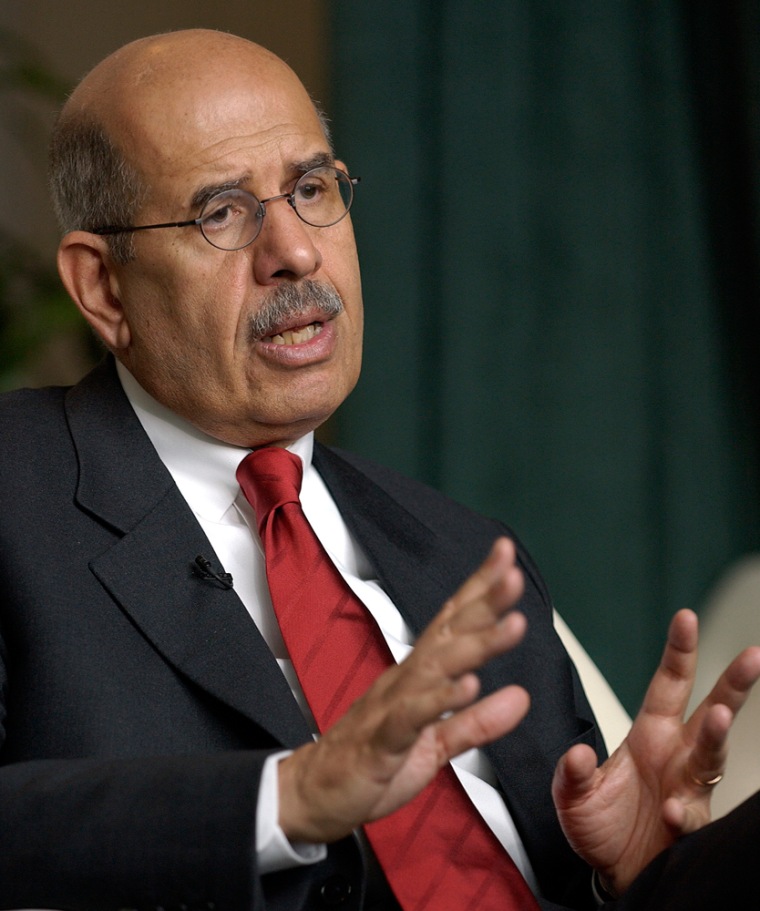The U.N. atomic watchdog on Friday warned that a North Korean nuclear test would have "disastrous political repercussions" and called on world leaders to pressure Pyongyang not to cross that line. The warning comes amid reports that U.S. spy satellites had detected what may be preparations for the regime's first test of a nuclear weapon, although some analysts believe it could be a calculated ruse on Pyongyang’s part.
Asked what the effect of a North Korean nuclear test would be, Mohamed ElBaradei told reporters: “There will be disastrous political repercussions in Asia and the rest of the world. I think there could be major environmental fallout, which could lead into dissemination of radioactivity in the region.”
“I hope every leader who has contact with North Korea is on the phone today with North Korean authorities to dissuade from test,” he said.
The satellite images show North Korea has dug and refilled a significant hole at a suspected test site in Gilju in the northeastern part of the country, said the official, discussing intelligence only on the condition of anonymity. The hole was dug in a manner consistent with preparations for an underground nuclear test, although it is not known whether the North Koreans deposited a weapon inside, the official said.
In addition, the official said, they have built some bleachers a sufficient distance from the hole, presumably for viewing any test.
Officials elsewhere in the U.S. government played down the remarks.
One who spoke on condition of anonymity said activity at the site could be consistent with preparations for a nuclear test, but other explanations are also possible.
The official said the U.S. government’s working assumption is that North Korea could test with little notice and is believed to have the technical capability to do so. Its decision is considered to be one of politics.
At the State Department, spokesman Tom Casey said, “We don’t have any new assessment” of North Korea. Casey said various North Korean statements had raised concerns and the United States was sharing them with other governments.
Although North Korea has claimed it has nuclear weapons, an actual test would be a first and confirm their capabilities to the world.
But the North Koreans also have a good idea when U.S. spy satellites are overhead — the U.S. does not possess enough to watch the country constantly — and are capable of making such preparations solely to cause a reaction among its adversaries, the defense official said.
The big question: What if?
But some analysts believe Pyongyang may well gamble on conducting a real test.
North Korean leader "Kim Jong Il in his mind benefits from a test because he thinks he'll get the recognition of being a nuclear power from the U.S.,” former CIA analyst Arthur Brown told NBC News.
This week, the United States warned North Korea that it has military options.
"The United States maintains significant — and I want to underline significant — deterrent capability of all kinds in the Asia-Pacific region," said Secretary of State Condoleezza Rice.
Since September, the Pentagon has had B2 stealth bombers and F15e fighter jets on alert in Guam and Diego Garcia and a contingency plan to take out North Korea's nuclear sites.
But America's allies in the region strongly oppose the military option. Just this month, South Korea rejected an upgraded contingency plan — Op Plan 5029 — for the United States to bomb North Korea if it tests a nuclear weapon.
Many experts say a military strike would be disastrous for the United States and its allies.
"You have a very dangerous situation where something could precipitate an irrational act and suddenly there’s a war with catastrophic consequences,” William Cohen, former U.S. Secretary of Defense, told NBC News.
Pressing for diplomatic solution
So far, most officials are still focused on a diplomatic solution, including efforts to restart the six-nation talks aimed at getting Pyongyang to forgo its nuclear ambitions, which have been stalled for nearly a year. They involve North and South Korea, the United States, China, Japan and Russia. North Korea has boycotted the talks since June, and on Friday reaffirmed it would stay away unless the United States dropped what it called hostile policy toward the communist regime.
Japan on Friday threatened to put the issue of North Korea’s nuclear weapons program before the U.N. Security Council next month unless six-nation talks on the dispute show progress.
But the disturbing reports continue to trickle out, and stir concern.
A senior Japanese Defense Agency official told The Associated Press that Japan’s government had information that North Korea might be preparing for a nuclear test.
The New York Times reported Friday that the U.S. government has informed Japan and South Korea about the satellite imagery. On Tuesday, South Korea’s mass-circulation Chosun Ilbo reported that U.S. satellite photos showed the frequent movement of trucks and the placement of cranes and other equipment in the North Korean town of Gilju.
